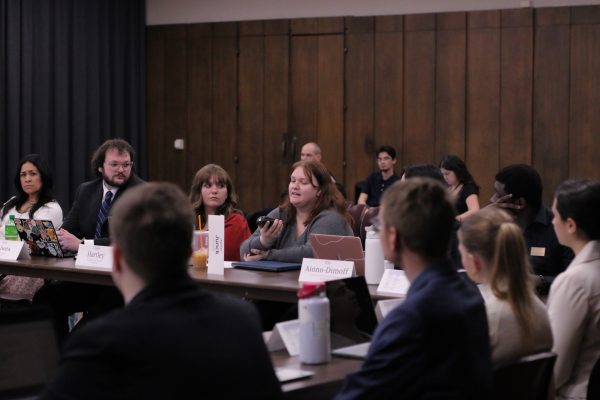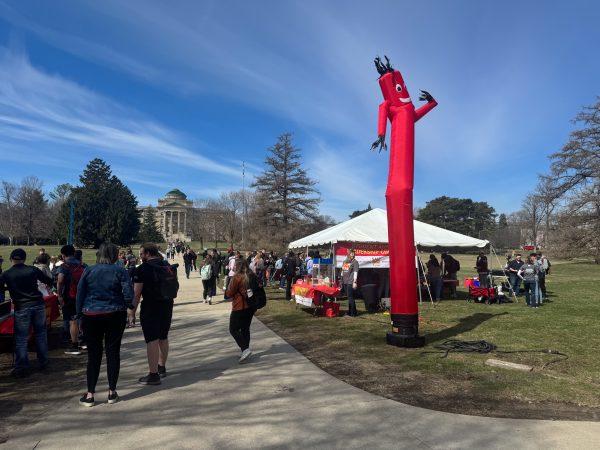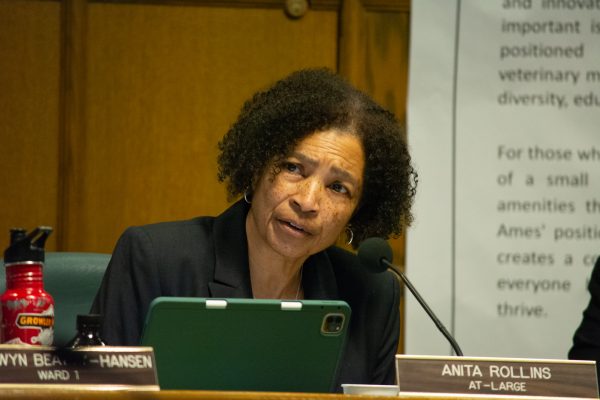Grassley, Klobuchar highlight bipartisan efforts to address drug pricing
Photo by Katherine Kealey/ Iowa State Daily
Iowa’s senior Republican Sen. Chuck Grassley at the Iowa Cattle Industry Headquarters in Ames, Iowa.
Republican Sen. Chuck Grassley and Democratic Sen. Amy Klobuchar highlighted legislation aimed at lowering drug prices and heard from Kathy Anderson, a resident of LeClaire, Iowa, who said she had had to pay $377 per month to pay for medication for her eye disease after retiring in 2019.
According to Senate documents, the Biosimilars Act aims to prohibit drug companies and biological product manufacturers from compensating generic drug companies and biosimilar and interchangeable product manufacturers to delay their entry into the market.
The Stop Significant and Time-wasting Abuse Limiting Legitimate Innovation of New Generics Act, also referred to as the Stop STALLING Act, aims to deter the filing of sham citizen petitions. according to Senate documents. The petitions serve as a means for individuals or organizations to request the FDA to change their health policy, but they are often used often used by pharmaceutical companies to delay the entry of generic drugs into the market.
According to the FDA, generics are copies of brand-name drugs that are made after the original patent has expired are identical to the original drug in terms of active ingredients, dosage, route of administration, safety and effectiveness. Biosimilars are copies of biologic drugs that are similar, but not identical to the original drug, but must demonstrate that they are no clinically meaningful differences between the biosimilar and the reference product in terms of the safety, purity and potency of the product.
Anderson said before she and her husband retired, she used to pay $45 for her monthly supply of eye medication.
“This topic of drug costs became really a driving interest for me when I suffered from a persistent gastrointestinal infection called [Clostridioides difficile],” Anderson said. “The medication that finally put this disease in remission costs $2,410 or 20 days.”
Anderson said the price had to be negotiated down for her to be able to afford it.
“My gastroenterologist had to barter with the insurance company to get approval, and even without that approval, my husband and I would have found a way to pay for it– I was that sick,” Anderson said.
Grassley highlighted the bipartisanship fostered by the bill.
“These bills were part of a tranche of proposals that I’ve already said were unanimously approved by the judiciary committee,” Grassley said. “Congress needs to finish the job so these bills can help consumers.”
Klobuchar said the Congressional Budget Office calculated that both bills would end up saving Americans $730 million.
“I know that the pharmaceutical companies, as Chuck Grassley knows, they’re working hard to halt our progress, but we have gotten the year off to a really good start,” Klobuchar said. “I think this is the earliest we passed the bills out of committee, giving us a full two years to push them through.”
Jessica Intermill, a resident of Minneapolis, a small business owner, wife and mother, shared how she has been impacted by drug costs while she was pregnant.
“Specialist after specialist told me I was fine. I just had to deliver it, was just a hard pregnancy, but I knew better, and I kept looking for answers,” Intermill said. “When I was seven months pregnant, I saw my first rheumatologist. By then, my disease was so bad, that he took one look from across the room and diagnosed me with rheumatoid arthritis.”
Intermill said she pays roughly $4,400 per month for her arthritis medication.
“That’s $50,000 per year, every year, and I have to find a way to pay that obscene price because if I don’t, my disease will eat holes in my organs,” Intermill said. “My pain will skyrocket, and I can’t be the citizen, the small business owner, the volunteer that my community depends on. I can’t be the wife and the mom that my family deserves. I have to pay the drug companies ransom. I have no choice.”
Grassley said with the bills being pushed into the session so soon, Congress will have plenty of time to get the bipartisan bill signed.
“We’ve got another 22 months to get these bills passed, so we got more time, and hopefully we don’t have to wait 22 months to get them passed,” Grassley said.
Klobuchar echoed sentiments similar to Grassley.
“We can have all kinds of trouble we can make when every bill comes up because ours went through committee first,” Klobuchar said. “Good trouble, I mean.”
Your donation will support the student journalists of the Iowa State Daily. Your contribution will allow us to purchase equipment, send our student journalists to conferences and off-set their cost of living so they can continue to do best-in-the-nation work at the Iowa State Daily.











